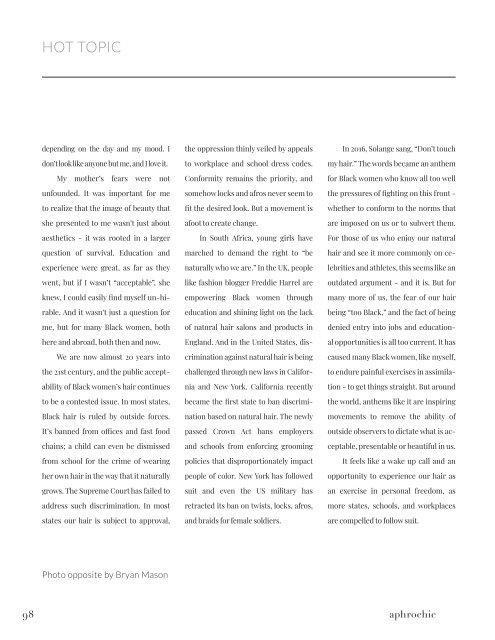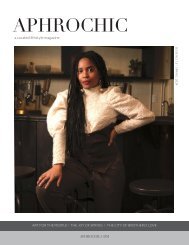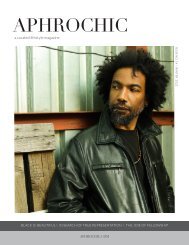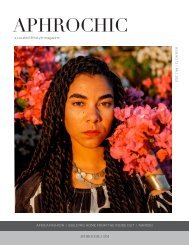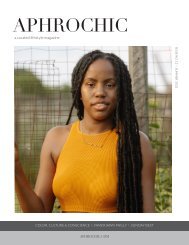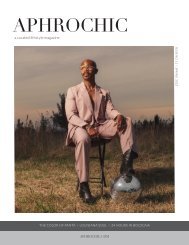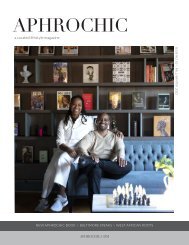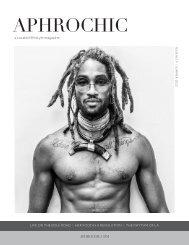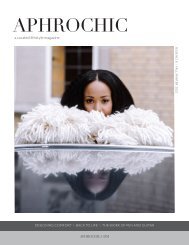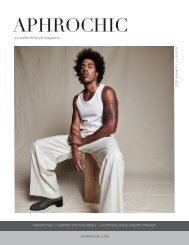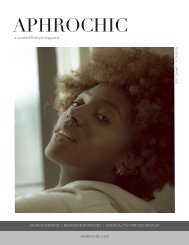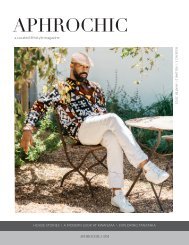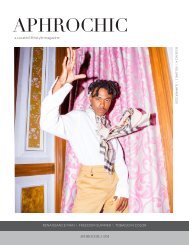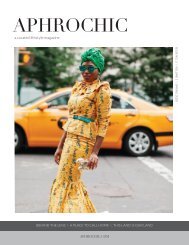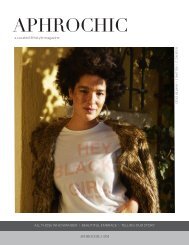AphroChic Magazine: Issue No. 1
Welcome to the Fall 2019 issue of AphroChic Magazine. Designed to celebrate the presence, innovation and accomplishments of creatives of color from all corners of the African Diaspora, we welcome the season in this issue with a focus on fashion, authentic beauty, and creating moments that bind us together. On the cover, New York fashion stylists, Courtney and Donnell Baldwin of Mr. Baldwin Style invite us to experience a fête in a historic part of Sag Harbor. We take a look inside the Brooklyn home of fashion designer and movement artist, Nana Yaa Asare-Boadu and experience her effortless aesthetic. Then, we go half way around the world on a photographic journey of Morocco, with photographer Lauren Crew. Along the way, you’ll find articles that explore the nature of the African Diaspora, the importance of the Black family home, and the books, art and accessories you’ll want to bring home this season.
Welcome to the Fall 2019 issue of AphroChic Magazine. Designed to celebrate the presence, innovation and accomplishments of creatives of color from all corners of the African Diaspora, we welcome the season in this issue with a focus on fashion, authentic beauty, and creating moments that bind us together.
On the cover, New York fashion stylists, Courtney and Donnell Baldwin of Mr. Baldwin Style invite us to experience a fête in a historic part of Sag Harbor. We take a look inside the Brooklyn home of fashion designer and movement artist, Nana Yaa Asare-Boadu and experience her effortless aesthetic. Then, we go half way around the world on a photographic journey of Morocco, with photographer Lauren Crew. Along the way, you’ll find articles that explore the nature of the African Diaspora, the importance of the Black family home, and the books, art and accessories you’ll want to bring home this season.
Create successful ePaper yourself
Turn your PDF publications into a flip-book with our unique Google optimized e-Paper software.
HOT TOPIC<br />
depending on the day and my mood. I<br />
don’t look like anyone but me, and I love it.<br />
My mother’s fears were not<br />
unfounded. It was important for me<br />
to realize that the image of beauty that<br />
she presented to me wasn’t just about<br />
aesthetics - it was rooted in a larger<br />
question of survival. Education and<br />
experience were great, as far as they<br />
went, but if I wasn’t “acceptable”, she<br />
knew, I could easily find myself un-hirable.<br />
And it wasn’t just a question for<br />
me, but for many Black women, both<br />
here and abroad, both then and now.<br />
We are now almost 20 years into<br />
the 21st century, and the public acceptability<br />
of Black women’s hair continues<br />
to be a contested issue. In most states,<br />
Black hair is ruled by outside forces.<br />
It’s banned from offices and fast food<br />
chains; a child can even be dismissed<br />
from school for the crime of wearing<br />
her own hair in the way that it naturally<br />
grows. The Supreme Court has failed to<br />
address such discrimination. In most<br />
states our hair is subject to approval,<br />
the oppression thinly veiled by appeals<br />
to workplace and school dress codes.<br />
Conformity remains the priority, and<br />
somehow locks and afros never seem to<br />
fit the desired look. But a movement is<br />
afoot to create change.<br />
In South Africa, young girls have<br />
marched to demand the right to “be<br />
naturally who we are.” In the UK, people<br />
like fashion blogger Freddie Harrel are<br />
empowering Black women through<br />
education and shining light on the lack<br />
of natural hair salons and products in<br />
England. And in the United States, discrimination<br />
against natural hair is being<br />
challenged through new laws in California<br />
and New York. California recently<br />
became the first state to ban discrimination<br />
based on natural hair. The newly<br />
passed Crown Act bans employers<br />
and schools from enforcing grooming<br />
policies that disproportionately impact<br />
people of color. New York has followed<br />
suit and even the US military has<br />
retracted its ban on twists, locks, afros,<br />
and braids for female soldiers.<br />
In 2016, Solange sang, “Don’t touch<br />
my hair.” The words became an anthem<br />
for Black women who know all too well<br />
the pressures of fighting on this front -<br />
whether to conform to the norms that<br />
are imposed on us or to subvert them.<br />
For those of us who enjoy our natural<br />
hair and see it more commonly on celebrities<br />
and athletes, this seems like an<br />
outdated argument - and it is. But for<br />
many more of us, the fear of our hair<br />
being “too Black,” and the fact of being<br />
denied entry into jobs and educational<br />
opportunities is all too current. It has<br />
caused many Black women, like myself,<br />
to endure painful exercises in assimilation<br />
- to get things straight. But around<br />
the world, anthems like it are inspiring<br />
movements to remove the ability of<br />
outside observers to dictate what is acceptable,<br />
presentable or beautiful in us.<br />
It feels like a wake up call and an<br />
opportunity to experience our hair as<br />
an exercise in personal freedom, as<br />
more states, schools, and workplaces<br />
are compelled to follow suit.<br />
Photo opposite by Bryan Mason<br />
<br />
aphrochic


